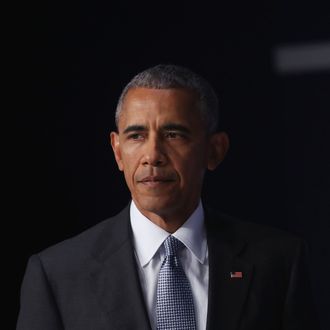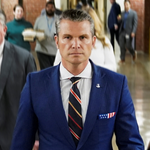
The general expectation for the president’s speech at the Democratic convention tonight is that he will do for Hillary Clinton what Bill Clinton — then called the “explainer-in-chief” — did for Barack Obama at the 2012 convention. After all, the previous “big speeches” in Philadelphia had other missions beyond making the case for the party’s candidate for persuadable voters: Michelle Obama offered the broad vision of America that Democrats embrace; Elizabeth Warren and Bernie Sanders focused on keeping restive progressives in the fold; and Bill Clinton touted his wife’s accomplishments, particularly early in her career, in great detail. So the 44th president inherits the big job of placing HRC’s candidacy on the right side of history, and Donald Trump’s on the very wrong side, right?
Maybe so, but maybe Obama’s prime objective should be a simpler task: making the case for the success of his own presidency.
It’s a bit counterintuitive in a contest between two such unusual major-party candidates to think that something other than the contrast between the two of them will matter most to persuadable voters, but in an odd way their well-known “negatives” may cancel each other out and make this a standard-brand competition where they could be any old Republican and Democrat. RealClearPolitics’ Sean Trende explains:
[P]ages have been written about Trump’s atrocious favorable ratings, which currently sit at 36.3 percent positive, 56.6 percent negative. But Clinton’s favorable ratings are not much better: She has a 38.4 percent positive rating and a 55.4 percent negative rating. That difference isn’t exactly meaningless, but it comes close.
What’s happened is that, amazingly, this race has been transformed into a race between a generic Republican and a generic Democrat. Right now, the so-called “fundamentals” of economic growth, presidential approval and incumbency point toward a slight Republican advantage. The polls simply reflect this.
If that’s true, or even half-true, Obama’s relatively strong but fragile job-approval rating could be as precious a resource for Hillary Clinton as anything he could say on her behalf. Aside from the possibility that swing voters could go to the polls thinking of November as a referendum on the last eight years, there’s the “time for a change” dynamic reinforced by very high “wrong track” sentiments that could tilt the playing field in the “out party’s” direction. Obama is the best salesman for his accomplishments and how many of them will be instantly undone if Donald Trump succeeds him as president.
In the end, Hillary Clinton herself may need to make the “two futures” argument that trusting in her is a vastly better bet than gambling the country’s future on an erratic and mendacious would-be strongman like Trump. But persuadable voters need to be predisposed to that choice by a better attitude toward the status quo, and an understanding that turning back the clock with a Republican president isn’t the kind of “change” they really want. Barack Obama is the best, and perhaps the only, politician in Philly to deliver that particular speech.






























